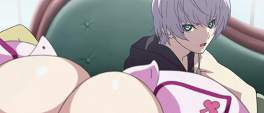When one's premise is a magical fuel present only in breast milk and requires young children to extract this via the most obvious method available, having an censored version available on all but the most liberal of television channels seems counter-productive. The uncensored version fills in a lot of the gaps that the other egregiously includes, obtuse close ups of faces and innocuous body parts only go so far before hard static cuts are made to conceal raunchy or revealing motions; unfamiliarity with the concept of Seikon no Qwaser would cause significant difficultly in understanding what the alternating moans of pleasure and pain were in reference to. The volume and abject lewdness of these scenes is quite staggering and it is no understatement to call the opening episodes of the series a panoply of pornography that don't attempt to mask their intentions.
At St. Mikhailov Academy, someone is murdering local girls; the incidents began shortly after the dean of school disappeared, leaving only a cryptic note to his biological daughter Tomo and adoptive daughter Mafuyu. Tomo is a sickly girl who is often absent from school which, now with her father missing, causes both her and her self-styled protector Mafuyu to be bullied by some of her classmates. After a chance meeting with a silver-haired Russian boy, Mafuyu is attacked by a masked psychopath and is drawn into the world of the Qwaser - alchemists with an affinity for certain elements and the need for soma, found only in selected girl's breast milk. The young boy, Alexander, is the Qwaser of iron and after joining the school and moving into the local dormitory, he vows to protect Tomo against all aggressors.
Describing Seikon no Qwaser is akin to explaining the plot of an adult movie: the story is inconsequential next to the amount of flesh and deviant acts contained within. The first episode wastes no time in its precipitous dive into perversion with clothes cutting, breast milking, underwear fondling and the all important breast jiggle. The remainder of the episode and the two after are a ludicrous veneration of female mammaries and undergarments; no debauchery is too extreme in its attempt to obscure what is, at its heart, standard fare with tropes such as an obstinate but chased foreigner, a softly-spoken airhead and a protectionist lead. The bawdiness however is intrinsically bound to the plot; no longer is it an amusing sideshow of occasional bath scenes or torn clothing during combat - although these are of course present - but core to the viewing experience which crosses the line from lamentable titillation to obscene misogyny.
The act of breast feeding is transformed from an otherwise pure act - something the series acknowledges with its religious iconography - into something perverse and laced with fury. Even in the opening three episodes, all of the female characters are shown as either weak, in need of near constant care, emotionless, catty and arrogant or otherwise irrepressibly insane. What few males there are however are shown as strong, smart and confident, able to fondle, disrobe and pleasure any woman within reach and then callously discard them like spent cigarettes without consequence. It's a disgusting and reprehensible attitude that is only bolstered by the violence and borderline sadism that underpins a lot of the conflict.
Many series fail for crippling mediocrity and though the may not elicit any feelings of adulation, they are at least incapable of provoking any darker emotions. Seikon no Qwaser would be obnoxious without it's lecherous approach to females, however its unflinchingly derogatory treatment of them speaks of deeply embedded resentment. Given the production team behind this which includes the director whose previous works encompass Eiken and Panty Flash Teacher, a series composer who also worked on School Days and a screenwriter who had similar duties on Linebarrels of Iron, as well as a studio whose only other work is the incestuous OVA Aki Sora, the approach isn't entirely surprising. The protagonist may share a great deal with My-HiME's Mai - a similarly fiery hair colour, an affinity for cooking and the guardianship of an infirmed family member - through series composer Hiroyuki Yoshino, however it shares none of its charm or cheeky humour. Dense with jargon and replete with violence, the opening episodes portray a series that is repulsive and meritless; it is difficult to speculate whether any good whatsoever could ever come from it.







